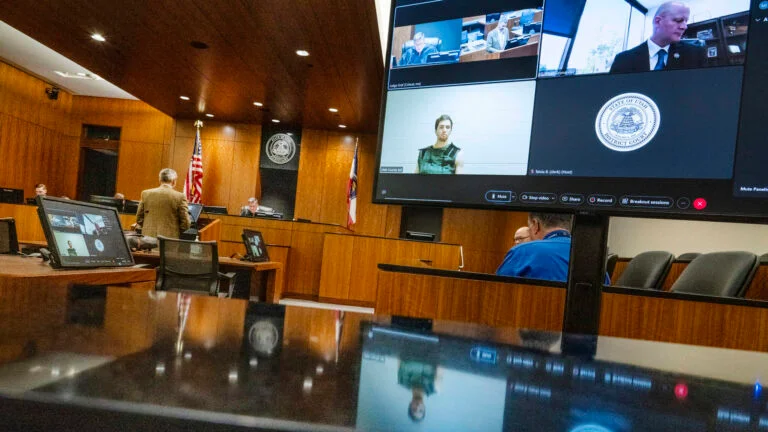
LOADINGERROR LOADING
The late Charlie Kirk advocated for free speech on his popular podcast and in debates against college kids.
But a week after the conservative political pundit was gunned down during one of those debates at a Utah college, numerous people have lost their jobs for exercising that same First Amendment right.
Advertisement
The highest profile example so far is Karen Attiah, a well-known Washington Post opinion columnist, who said on Monday that she was fired by the paper over social media posts she shared about Kirk’s assassination.
Attiah ― the paper’s last Black opinion columnist ― denounced Kirk’s murder, but also posted and reposted several opinions “speaking out against political violence, racial double standards, and America’s apathy toward guns,” she explained on Substack.
The Post said her social media comments were “unacceptable,” “gross misconduct” and endangered “the physical safety of colleagues,” Attiah wrote. A spokesperson for the Post declined to comment “on personnel matters,” but the paper’s termination letter to her quotes one of her posts that said, “Refusing to tear my clothes and smear ashes on my face in performative mourning for a white man that espoused violence is….not the same as violence.”
Advertisement
Attiah isn’t alone in being let go for her remarks. Last week, dozens of people across the country were fired, put on leave, investigated or faced calls to resign because of social media posts criticizing Kirk or extolling his death, according to analysis by NPR.
Others have been doxxed. In the immediate aftermath of the killing ― the same evening, in fact ― hardline supporters of the Turning Point founder created a website, Charlie’s Murderers, where they listed personal information (social media usernames, photos, email addresses, employers) of people who the group claimed were celebrating Kirk’s slaying.
Advertisement
While some of the reported comments were indeed violent in nature, the majority of the tweets and posts were either snarky or quoted back Kirk’s words on gun violence, mass shootings and the nature of empathy. Other posters simply expressed fears about those on the right “retaliating” after the shooting.
Some listed on the website told Wired that they’d received death threats after their postings were made public.
On Monday, while guest-hosting Kirk’s podcast, Vice President JD Vance said he supported such doxing efforts. When you “see someone celebrating Charlie’s murder” you should “call them out,” Vance said. “Hell, call their employer. We don’t believe in political violence, but we do believe in civility, and there is no civility in the celebration of political assassination.”
Advertisement
Dismissing the First Amendment, U.S. Attorney General Pam Bondi has also said the administration plans to broadly target “hate speech” centered around Kirk, though she walked back her statements in the face of criticism.
It’s insensitive to speak ill of the dead, but there are no laws against it.
Academics and experts who study the First Amendment and protected speech say censoring conversation around Kirk’s death is deeply unnerving.
“What is happening to people who reject the canonization of Charlie Kirk is a tragedy and a disgrace,” said Mark A. Graber, a regents professor of law at the University of Maryland, and a leading scholar on constitutional law and politics.
Advertisement
First Amendment laws generally don’t apply to private employers, allowing them to fire employees for speech without violating that constitutional provision. “Still, the principle of free speech is taking a beating,” Graber said.
Organized campaigns to pressure employers to fire employees for social media posts is “almost always concerning,” said Keith E. Whittington, a David Boies professor of law at Yale Law School and the faculty director of the Center for Academic Freedom and Free Speech.
“The path of least resistance for an employer is often going to be giving into such pressure campaigns, even when disciplining an employee is not really justifiable,” Whittington told HuffPost. “Such efforts are designed to chill political speech, and that’s not terribly healthy for a democracy.”
Advertisement
Kirk ― killed while practicing free speech ― went to colleges and would set up “prove me wrong” tables where he would engage in debates with college students. That made him a polarizing figure; the pundit, who defended the First Amendment and even “hate speech” as recent as last year, frequently made incendiary comments about immigrants, women, Black people and his political nemeses.
“Given the recent political campaign to make Kirk an American hero, it’s entirely appropriate to point out the many ways he is not,” Graber said.
Advertisement
It may be insensitive to speak ill of the dead ― and unwise to immediately post a hot take on something as contentious as a political assassination ― but keeping your opinions to yourself until the dead are buried is hardly mandated by the First Amendment, Graber said.
The Washington Post firing is particularly interesting, Graber said. The newspaper’s opinion section has shifted over the past year to reflect the wishes of its owner, Jeff Bezos, who ordered the Post’s opinion section to embrace “personal liberties and free markets” back in February. As Attiah was reminded in her termination letter, the Post’s company-wide social media policy mandates that all employee social media postings be respectful, and prohibits postings that disparage people based on their race, gender or other protected characteristics.
That’s where it gets dicey, Garber said. “If the Washington Post can fire a columnist who uses Kirk’s own words to criticize him because that might cause discord in the workplace, should the Post also fire persons who praise Kirk because other employees who think Kirk was a racist and sexist demagogue might take offense?”
Advertisement
Ultimately, there’s a difference between what’s crossed the line into violent speech and should be censored, and what’s classless to post but shouldn’t necessarily be career-ending. That nuance is lost here, Whittington said.
“We would be better off as a society, if we could exercise more judgment and deliberation in evaluating speech with which we disagree and considering how we might respond to it,” the professor said.
Another example of free speech under attack.
This is all happening as the Trump administration continues its unprecedented assaults on free speech, noted Adam Goldstein, vice president of strategic initiatives at the Foundation for Individual Rights and Expression.
Advertisement
“A number of the president’s actions have been contrary to freedom of expression, like suing J. Ann Selzer personally and his administration threatening to deport immigrants over protected speech,” he told HuffPost.
Some, including prominent Democrats lawmakers, fear the Trump administration will use Kirk’s assassination as a pretext to crush their political opposition.
Advertisement
Their fears aren’t without basis. On Friday, Stephen Miller, Trump’s policy chief, remarked, “The last message Charlie Kirk gave to me before he joined his creator in heaven was he said that we have to dismantle and take on the radical left organizations in this country that are fomenting violence. We are gonna do that.”
Even so, the current cancel culture moment isn’t something the administration created, even if some of their agencies are egregiously participating in it, Goldstein said.
20 Years OfFreeJournalism
Your SupportFuelsOur Mission
Your SupportFuelsOur Mission
For two decades, HuffPost has been fearless, unflinching, and relentless in pursuit of the truth. Support our mission to keep us around for the next 20 — we can’t do this without you.
We remain committed to providing you with the unflinching, fact-based journalism everyone deserves.
Thank you again for your support along the way. We’re truly grateful for readers like you! Your initial support helped get us here and bolstered our newsroom, which kept us strong during uncertain times. Now as we continue, we need your help more than ever. We hope you will join us once again.
We remain committed to providing you with the unflinching, fact-based journalism everyone deserves.
Thank you again for your support along the way. We’re truly grateful for readers like you! Your initial support helped get us here and bolstered our newsroom, which kept us strong during uncertain times. Now as we continue, we need your help more than ever. We hope you will join us once again.
Support HuffPost
Already contributed? Log in to hide these messages.
“Americans should remember that this isn’t the first time, and it won’t be the last time people have been targeted for their opinions after a tragedy,” he said.



